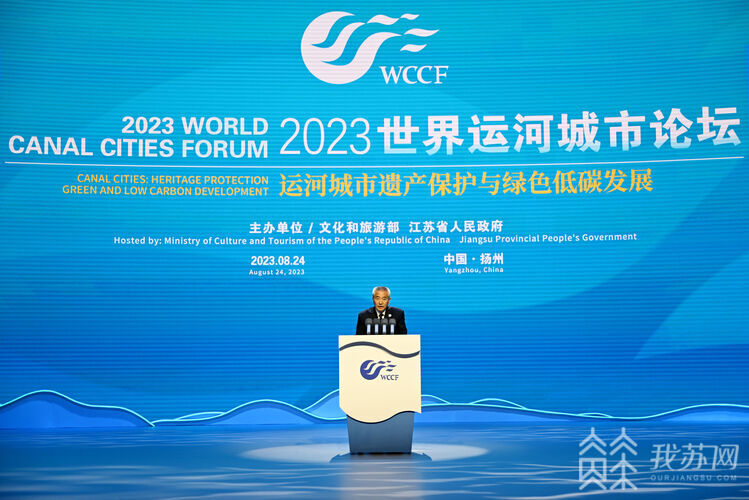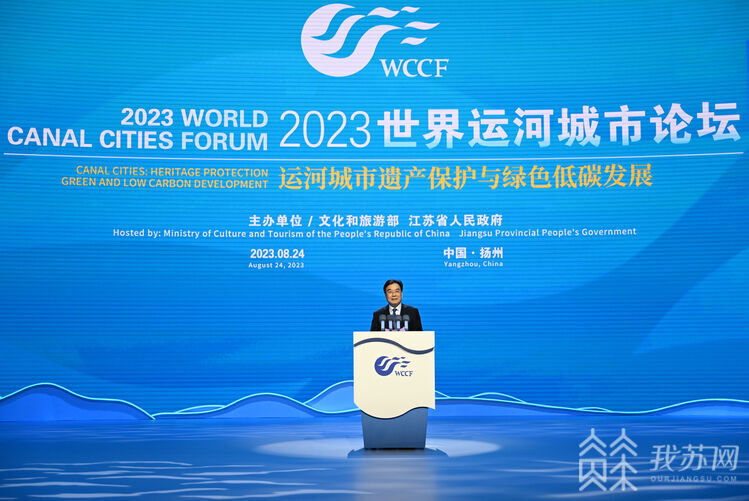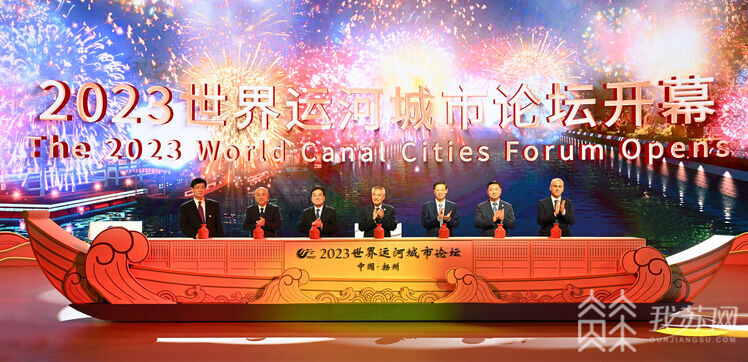East China’s Jiangsu province kicked off the annual session of the World Canal Cities Forum in Yangzhou city on Thursday. The event was co-hosted by the Ministry of Culture and Tourism and the People's Government of Jiangsu Province. Shao Hong, Vice Chairman of the National Committee of the Chinese People's Political Consultative Conference and Executive Vice Chairman of the Central Committee of the Jiusan Society, delivered a speech. Xin Changxing, Secretary of the Provincial Party Committee, delivered a speech, and Governor Xu Kunlin presided over the opening ceremony.

Shao Hong pointed out that the Grand Canal is engraved with historical memories, carries the changes of today, and represents future progress, making it an important carrier for the inheritance and development of human civilization, and our common wealth and spiritual home.
As one of the models of artificial canals, for thousands of years, China's Grand Canal has traversed history, flowing day and night to this day, promoting economic development, cultural dissemination, and social change. Just like the continuous and vibrant Chinese civilization, it embodies the great creative spirit, great struggle spirit, great unity spirit, and great dream spirit of the Chinese people.
Noting that protecting, inheriting, and utilizing the canal culture is a glorious mission bestowed on us by the times, and also the common responsibility of canal cities, Shao Hong remarked that China has always attached great importance to the protection, inheritance, and utilization of the Grand Canal culture, as is evidenced by the recent study and implementation of General Secretary Xi Jinping’s important instructions so as to actively promote the construction of the Grand Canal Cultural Belt and National Cultural Park.
He said that the theme of this forum Canal City Heritage Protection and Green and Low Carbon Development responds to the common challenges faced by the economic and social development of canal cities in today's era, aligns with the common vision of canal cities, and will inject new impetus into promoting cultural exchange and cooperation, green and low-carbon development, and achieving common prosperity in world canal cities.
He hoped that the canal cities around the world will further join hands, prioritize protection to promote the sustainable use of canal heritage, prioritize ecology to promote the green transformation of canal cities, adhere to innovation driven policies to promote the vitality of canal cities, adhere to win-win cooperation to promote canal cultural exchange and mutual learning, and make due contributions to the protection of canal city heritage and green and low-carbon development with the greatest enthusiasm.
Noting that Jiangsu is the cradle and core area that nurtured the Grand Canal in China, while Yangzhou is the origin city and leading city for the application for World Heritage, Shao Hong hoped Jiangsu to continue to give full play to its advantages and take the lead in the cultural protection, inheritance, and utilization of the Grand Canal, demonstrating greater responsibility and achievements in building modern Chinese civilization.

In his speech, Xin Changxing expressed his gratitude to friends at home and abroad who have long cared and supported the development of Jiangsu.
He said that the Grand Canal and its culture are important platforms and "universal languages" for international dialogue and exchange. The Grand Canal of China spans ancient and modern times, runs through the north and south, connects China and foreign countries, and connects the Yangtze and Yellow Rivers. Together, it has nurtured a brilliant Chinese civilization, shining with the brilliance of the new era in creative transformation and innovative development, making it an important source of water for building modern Chinese civilization.

After the opening ceremony, the "Yangzhou Initiative for World Canal Cities Heritage Protection and Green and Low Carbon Development" was passed.





